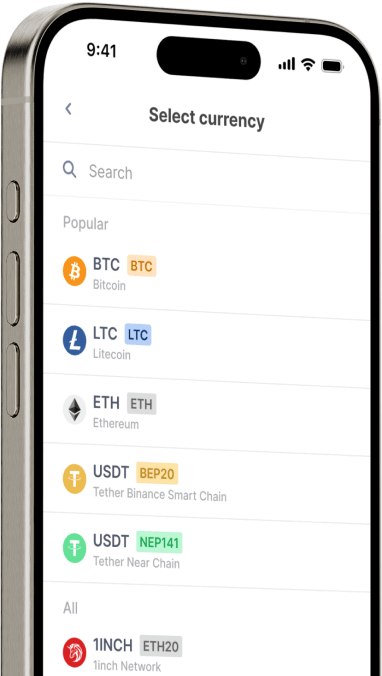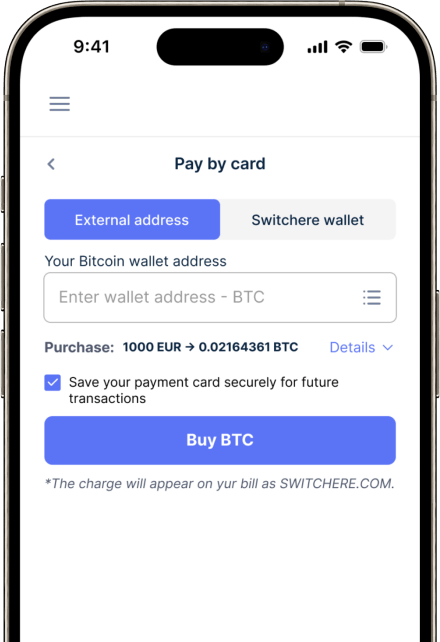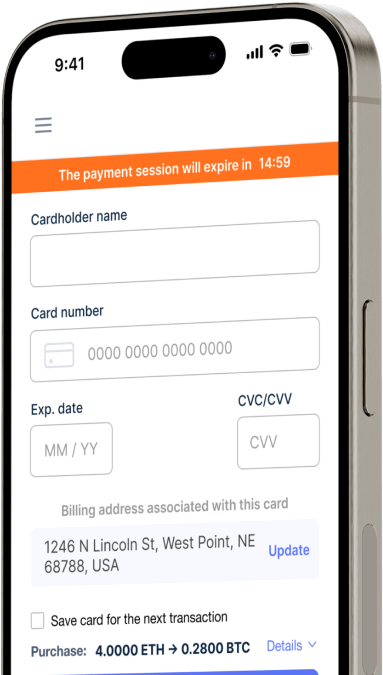Convertire
Azerbaijan Manat (AZN) in Binance USD (BUSD) istantaneamente
Acquistate facilmente Binance USD (BUSD) con Azerbaijan Manat (AZN) su Switchere e beneficiate di transazioni rapide e sicure.
Circa
Binance USD (BUSD)
BUSD (BUSDBSC) è una stablecoin regolamentata, sostenuta da fiat e ancorata 1:1 al dollaro USA, progettata per fornire stabilità di prezzo nel volatile panorama degli asset digitali. Emessa da Paxos Trust Company in collaborazione con Binance, BUSD mira a offrire un mezzo di scambio e una riserva di valore affidabili. Il ticker "BUSDBSC" indica specificamente la sua presenza come token BEP-20 sulla BNB Smart Chain, una rete decentralizzata ad alte prestazioni che facilita ampie applicazioni DeFi. La tecnologia di base di BUSD si basa su riserve trasparenti e verificate di dollari USA detenute in conti dedicati, garantendo che ogni token sia supportato da una quantità equivalente di valuta fiat. Ciò contrasta con le stablecoin algoritmiche, offrendo un approccio diverso al mantenimento del peg e della sicurezza crittografica.
L'utilità principale di BUSD, in particolare della sua variante BUSDBSC, è quella di consentire transazioni e partecipazioni senza soluzione di continuità nell'ecosistema della BNB Chain con un rischio di prezzo minimo. La sua tokenomica è semplice: nuovi BUSD vengono coniati quando i dollari vengono depositati presso Paxos, e bruciati quando vengono riscattati, mantenendo la copertura 1:1. Tra i principali casi d'uso vi sono la negoziazione contro altre criptovalute su borse come PancakeSwap, la funzione di garanzia nei protocolli di prestito e di indebitamento, la coltivazione dei rendimenti all'interno di varie applicazioni DeFi e la facilitazione dei pagamenti peer-to-peer. In quanto stablecoin approvata dal NYDFS (per la versione Ethereum emessa da Paxos) e ampiamente adottata, BUSD svolge un ruolo significativo nel fornire liquidità e una rappresentazione affidabile e conforme del dollaro digitale su varie piattaforme tecnologiche blockchain, fungendo da elemento fondamentale per molte infrastrutture Web3 e attività finanziarie on-chain.
Acquistare altre 150+ criptovalute per Azerbaijan Manat (AZN)
Altre monete per Azerbaijan Manat (AZN)
-
AZN per ZRX
-
AZN per 1INCH
-
AZN per AAVE
-
AZN per ACH
-
AZN per ALGO
-
AZN per TLM
-
AZN per ANKR
-
AZN per APE
-
AZN per NFT
-
AZN per API3
-
AZN per APT
-
AZN per ARPA
-
AZN per AUDIO
-
AZN per AVAX
-
AZN per AVAX
-
AZN per AXS
-
AZN per BADGER
-
AZN per BAL
-
AZN per BNT
-
AZN per BAT
-
AZN per BNB
-
AZN per BUSD
-
AZN per BSW
-
AZN per BSV
-
AZN per BLUR
-
AZN per BONE
-
AZN per CTSI
-
AZN per CELR
-
AZN per CELO
-
AZN per CEL
-
AZN per LINK
-
AZN per CHZ
-
AZN per CHR
-
AZN per C98
-
AZN per COMP
-
AZN per CFX
-
AZN per PEOPLE
-
AZN per CVX
-
AZN per ATOM
-
AZN per CTC
-
AZN per CRV
-
AZN per DAI
-
AZN per DASH
-
AZN per MANA
-
AZN per DENT
-
AZN per DGB
-
AZN per LEASH
-
AZN per DYDX
-
AZN per XEC
-
AZN per EOS
-
AZN per ETC
-
AZN per ENS
-
AZN per ETHW
-
AZN per FET
-
AZN per FIL
-
AZN per FLOKI
-
AZN per GALA
-
AZN per GNO
-
AZN per ONE
-
AZN per HBAR
-
AZN per HOT
-
AZN per HOOK
-
AZN per ICX
-
AZN per ILV
-
AZN per IMX
-
AZN per INJ
-
AZN per ICP
-
AZN per IOST
-
AZN per IOTX
-
AZN per JASMY
-
AZN per JST
-
AZN per KAVA
-
AZN per KCS
-
AZN per KSM
-
AZN per KNC
-
AZN per LDO
-
AZN per LQTY
-
AZN per LPT
-
AZN per LOOKS
-
AZN per LRC
-
AZN per LUNA
-
AZN per MKR
-
AZN per MASK
-
AZN per EGLD
-
AZN per ALICE
-
AZN per NEAR
-
AZN per XEM
-
AZN per NEXO
-
AZN per NOT
-
AZN per NMR
-
AZN per OKB
-
AZN per OMG
-
AZN per ONT
-
AZN per EDU
-
AZN per OP
-
AZN per OGN
-
AZN per CAKE
-
AZN per PAXG
-
AZN per PENDLE
-
AZN per DOT
-
AZN per POL
-
AZN per QTUM
-
AZN per QNT
-
AZN per RDNT
-
AZN per XRD
-
AZN per RVN
-
AZN per REN
-
AZN per RSR
-
AZN per RLC
-
AZN per RPL
-
AZN per SFP
-
AZN per SHIB
-
AZN per SKL
-
AZN per SXP
-
AZN per STND
-
AZN per STG
-
AZN per XLM
-
AZN per GMT
-
AZN per STORJ
-
AZN per STMX
-
AZN per SUSHI
-
AZN per SNX
-
AZN per USDT (NEP141)
-
AZN per USDT (FA2)
-
AZN per USDT (TRC20)
-
AZN per USDT (JETTON)
-
AZN per USDT (SPL)
-
AZN per USDT (ERC20)
-
AZN per USDT (AVAC)
-
AZN per USDT (BEP20)
-
AZN per USDT (Polygon)
-
AZN per XTZ
-
AZN per GRT
-
AZN per SAND
-
AZN per TFUEL
-
AZN per THETA
-
AZN per RUNE
-
AZN per TON
-
AZN per TUSD (BEP20)
-
AZN per TUSD (TRC20)
-
AZN per TWT
-
AZN per UOS
-
AZN per UMA
-
AZN per UNI
-
AZN per USDC (SPL)
-
AZN per USDC (Polygon)
-
AZN per USDC (OP)
-
AZN per USDC (TRC20)
-
AZN per USDC (BEP20)
-
AZN per USDC (BEP20)
-
AZN per USDC (AVAC)
-
AZN per USDC (ARB)
-
AZN per USDC (ERC20)
-
AZN per VET
-
AZN per VRA
-
AZN per WAXP
-
AZN per WOO
-
AZN per WLD
-
AZN per WBTC
-
AZN per WMINIMA
-
AZN per XDC
-
AZN per YFI
-
AZN per YGG
-
AZN per ZIL
Come acquistare gli Binance USD (BUSD)
Domande frequenti
-
Che cos'è esattamente la coppia di trading AZN/BUSD?
La coppia AZN/BUSD rappresenta un mercato diretto su un exchange di criptovalute per scambiare il token AZN contro Binance USD (BUSD). BUSD è una stablecoin con collaterale 1:1 in USD, emessa da Paxos e approvata dal NYDFS. Questa coppia consente ai trader di valutare il token di utilità AZN direttamente in un asset digitale regolamentato che rispecchia il dollaro statunitense, facilitando la scoperta del prezzo e la gestione del rischio all'interno dell'ecosistema AZN.
-
Perché usare la stablecoin BUSD per scambiare AZN invece di altre criptovalute?
L'uso di BUSD offre stabilità in un mercato volatile. Essendo una stablecoin con collaterale fiat, il suo valore è ancorato 1:1 al dollaro statunitense. Ciò consente ai detentori di AZN di bloccare i profitti o di coprirsi contro i cali di prezzo senza dover convertire in valuta fiat. Inoltre, le transazioni BUSD sullo standard BEP-20 (Binance Smart Chain) sono note per i loro tempi di regolamento rapidi e le basse commissioni di transazione, rendendo gli scambi più efficienti. Il suo status regolamentato aggiunge anche un livello di fiducia.
-
Quali sono le commissioni tipiche associate agli scambi AZN/BUSD?
Le commissioni dipendono dalla piattaforma di trading. Su un exchange centralizzato, di solito si paga una piccola commissione di trading basata sulla percentuale del volume della transazione. Su un exchange decentralizzato, si paga una commissione di swap alla pool di liquidità (ad es. 0,25%) e una commissione di rete o 'gas' separata ai validatori della Binance Smart Chain per elaborare la transazione sulla blockchain. Questa commissione sul gas, pagata in BNB, fluttua in base alla congestione della rete.
-
Quali sono le piattaforme comuni per scambiare AZN contro BUSD?
Lo scambio AZN/BUSD avviene principalmente su piattaforme che supportano gli asset della Binance Smart Chain (BSC). Queste includono exchange centralizzati (CEX) che listano la coppia nella loro sezione di trading spot con un order book, e exchange decentralizzati (DEX) come PancakeSwap, dove gli utenti possono scambiare token direttamente dal loro portafoglio crypto tramite una pool di liquidità. La scelta dipende dalle preferenze dell'utente per la custodia e i tipi di ordine.
-
Quali conoscenze tecniche sono necessarie per scambiare la coppia AZN/BUSD su un DEX?
Per scambiare AZN/BUSD su un exchange decentralizzato (DEX), è necessario un portafoglio crypto non-custodial compatibile con la Binance Smart Chain (BSC), come MetaMask o Trust Wallet. Devi capire come connettere il tuo portafoglio al DEX, approvare le interazioni degli smart contract e impostare una tolleranza allo slippage appropriata per evitare transazioni fallite. È anche fondamentale essere consapevoli delle commissioni sul gas (pagate in BNB) per eseguire lo swap sulla blockchain.
-
In che modo lo status normativo di BUSD influisce sulla coppia di asset digitali AZN/BUSD?
Il fatto che BUSD sia emesso da Paxos, una società fiduciaria regolamentata, e sia approvato dal Dipartimento dei Servizi Finanziari dello Stato di New York (NYDFS) aggiunge notevole fiducia e trasparenza alla coppia. Garantisce che BUSD sia completamente coperto da riserve, soggette ad attestazioni mensili. Sebbene questa regolamentazione non si applichi al token AZN stesso, abbinarlo a una stablecoin regolamentata fornisce un asset di base più affidabile e sicuro per il trading e la valutazione rispetto a stablecoin algoritmiche o non regolamentate.




